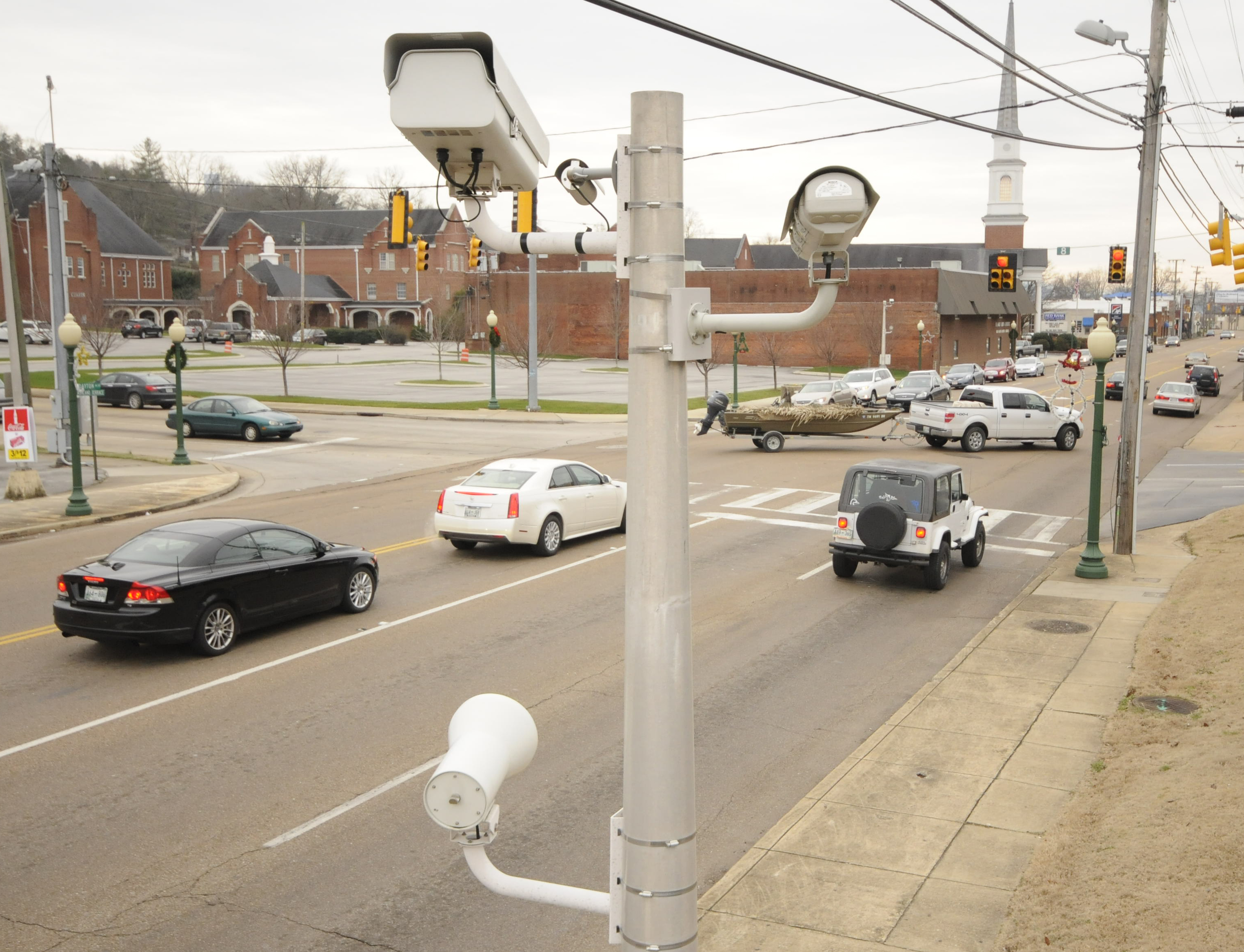BY THE NUMBERS4: Traffic cameras in Red Bank72,325: Tickets issued since Red Bank's traffic cameras were put in place in 200613: Percentage of repeat offenders$17,932: Camera-generated ticket revenue for fiscal 2013 to date$1 million: Camera-generated ticket revenue for Red Bank since 2006
At midnight Jan. 19, the traffic cameras on Dayton Boulevard in Red Bank will go dark.
American Traffic Solutions, the company that operates the city's traffic cameras, will flip a switch remotely, shutting down cameras at all three intersections where they're in place. The cameras will be physically removed later, company spokesman Charles Territo said.
But the cameras will operate right up until the contract with American Traffic Solutions ends. The last ticket could be issued at 11:59 p.m. on Jan. 18, Red Bank Police Chief Tim Christol said.
Once the switch is flipped, there will be no more tickets, no more complaints and no more "black eye" for the city, officials hope.
The cameras at Morrison Springs Road, Signal Mountain Road and Ashland Terrace long have been a point of contention for the public and merchants, who complain they stifle business growth in Red Bank.
One of the first local towns to adopt traffic cameras, Red Bank has issued about 72,000 tickets for speeding and red-light violations since 2006. Only 13 percent were given to repeat offenders.
"On the public safety side, I think they've been very beneficial," Christol said.
The intersection at Ashland Terrace had a 42 percent drop in red-light violations after the cameras were installed, Territo said.
The cameras' effectiveness led the Red Bank Board of Commissioners to extend the city's contract with American Traffic Solutions for 12 years in 2010.
But the contract had a built-in escape clause -- either party was able to break it without financial penalty on each three-year anniversary as long as it gave 90 days' notice.
In September, commissioners did exactly that, voting 4-1 to end the contract. The sole vote against was former Commissioner Ruth Jeno.
What changed?
Former Mayor Monty Millard and John Roberts, now mayor, both campaigned on promises to end the red-light cameras and led the charge to break the contract in September.
Floy Pierce, now vice mayor, is the only member left on the commission who voted to extend the contract in 2010. But she changed her mind as complaints grew.
"It was the business owners and residents that really changed my mind," Pierce said. "If the majority of those people would like to see what it would be like, I'm willing to also."
For Commissioner Ken Welch, the vote was tough.
Welch works as a surgical nurse at Erlanger hospital and refers to himself as a "car safety fanatic," having seen too many times the devastation wrought by car crashes.
Though some constituents told him they wanted to keep the cameras, Welch said a much larger number wanted them gone.
"I did a lot of soul-searching on it," he said. "The bottom line is, the net [result] was a positive thing for the city."
Business owners said the hated cameras cost them business.
"I would see people that I hadn't seen in a while, and they would tell me they didn't like the cameras, or weren't coming in because of the cameras," said Brian Macphee, manager of Red Bank Wine and Spirits.
Kathy Schein, past president of the Red Bank Chamber Council and current liaison between the council and the city, said getting rid of the bad image associated with the cameras can only benefit the city.
"I hope that the people that feel uncomfortable with the cameras, I hope that they feel comfortable coming into Red Bank now," Schein said.
What's next?
There are still questions about how losing the traffic cameras will affect Dayton Boulevard, but Roberts and other city leaders say their focus will be on drawing more businesses to Red Bank.
Macphee said he hopes more people will visit his store and others.
"I certainly hope for the best," Macphee said. "Red Bank could use the revitalization."
Red Bank also will lose the revenue the traffic cameras generated.
Though between 40 and 60 percent of the revenues went to American Traffic Solutions, the $50 tickets generated more than $1 million for the city since 2006.
Welch doesn't think the loss will be tough to swallow.
"We're in line to be a hot area," Welch said. "I think it will be offset by the economic growth. At least, that's what I hope."
And drivers may lapse into their old bad habits.
A team of researchers at Old Dominion University studied driver behavior at four Virginia intersections where traffic cameras were removed and four intersections that never had the cameras.
They found that in 2,800 light cycles, 12 percent of drivers crossed on red after the cameras were gone -- four times the percentage who crossed on red when cameras were in place. At intersections that never had cameras, 14 to 15 percent of drivers crossed on red.
Christol said he's optimistic but added that his officers still will be looking for drivers running red lights.
And Pierce said the cameras could be brought back if a public safety issue arises.
But for now, the cameras are going dark -- something that will please business owners, Pierce said.
"I think it will give them a sigh of relief," she said. "I know they are the ones that have suffered the most."

